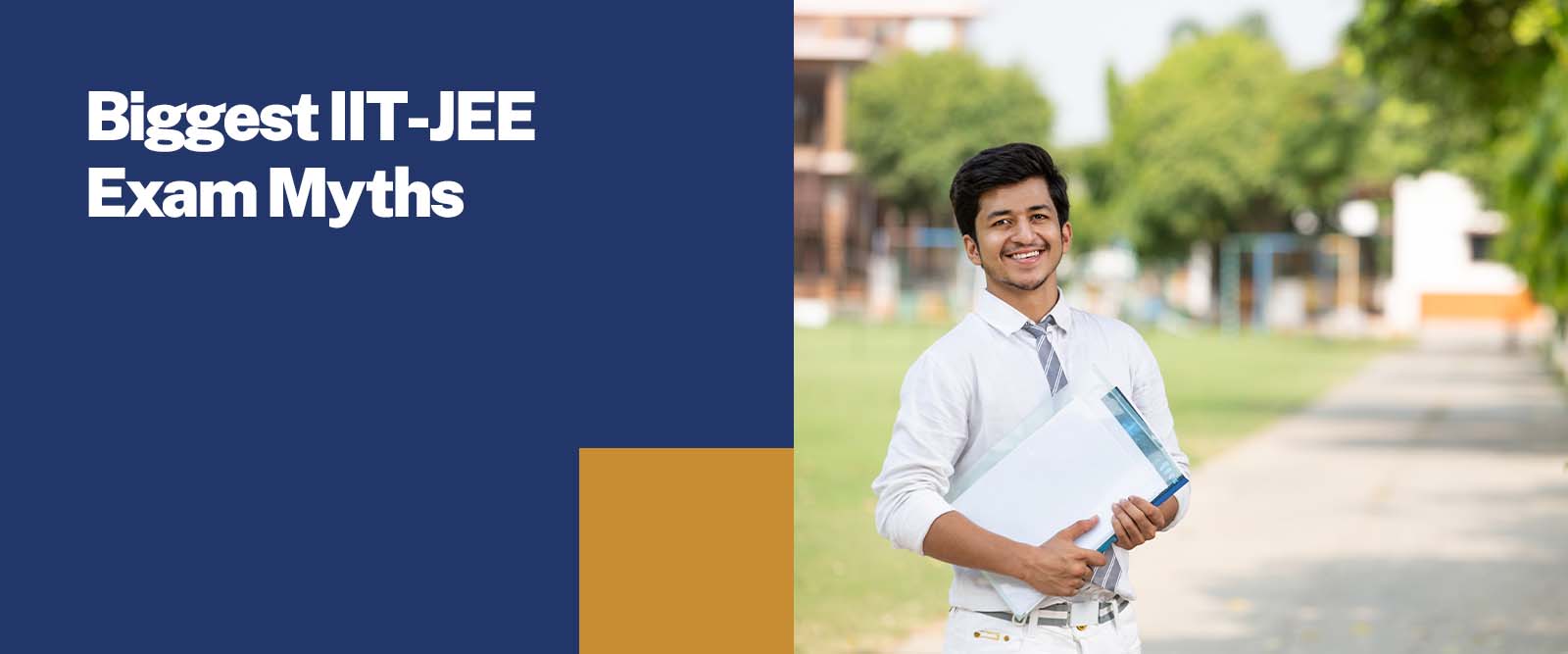5800 students unlocked their dream jobs with UG/PG programs in top colleges. Apply Now!
When there is any discussion about competitive exams, few hold as much significance and prestige as the Indian Institutes of Technology Joint Entrance Examination (IIT-JEE). It is a gateway to a world of possibilities, opening the doors to many B.Tech programs at esteemed universities. However, amidst aspirations and dreams, myths and misconceptions have woven a tapestry of doubt and uncertainty around this challenging exam. In this blog, we will burst some of the common myths regarding JEE Main, that will hopefully encourage you to pursue your B.tech degree.
What is IIT-JEE?
- JEE Main full form is Joint Entrance Examination - Main, which is a national-level engineering entrance examination conducted by the National Testing Agency (NTA) in India. In recognised institutions like the National Institutes of Technology (NITs), Indian Institutes of Information Technology (IIITs), and other centrally-funded technical institutes, it acts as a required exam for admission to undergraduate engineering programmes. Not only this, but JEE Main also serves as the qualifying examination for JEE Advanced which altogether decides your qualifying score for admissions.
- Candidates may enter the JEE Main exam if they have successfully completed or are currently taking their 10+2 (or equivalent) exam with Physics, Chemistry, and Mathematics as required courses. There is no age limit for candidates.
- JEE Main is conducted in two modes:
Paper 1: Consists of MCQs from physics, chemistry, and mathematics and is used to determine admission to B.E./B.Tech programmes. It is a computer-based test (CBT) that can be taken online or on paper.
Paper 2: For admission to B.Arch/B. Plan programmes, this test contains a drawing test, an aptitude test, and multiple-choice questions (MCQs) for math and aptitude. Pen and paper method is used to administer the Drawing Test.
- The JEE Main syllabus is broad and includes material from mathematics, physics, and chemistry. The syllabus is meant to assess the candidate's knowledge of concepts and problem-solving skills.
Top common myths about IIT-JEE
There are several myths surrounding IIT-JEE. Here are a few common ones:
IIT JEE Exam is Only for Genius
It's widely believed that an average student cannot pass the IIT JEE exam. The phrase "average student" is unfair and does not accurately describe a person's genuine capacity or ability to succeed on a competitive exam like the IIT JEE. Any student can work for success and accomplish their objectives with the correct attitude, commitment, and preparation.
You have to be a Bookworm for better marks
It's commonly believed that getting better grades requires only reading more books. While reading books can undoubtedly improve academic performance, it is not the only aspect that determines whether a student will receive a higher grade.
Academic success depends on a thorough knowledge of the material, active learning, real-world application, and the use of efficient study methods, if not more so.
Board Preparation and JEE Main Preparation is the same
It's often believed that preparing for board exams and the JEE Main is the same. It is important to realise that these two exams have different formats, goals, and requirements. Board exams could take a more theoretical approach, but the JEE heavily focuses on problem-solving abilities. JEE candidates must practise handling a variety of complicated issues, improve their logical thinking, and apply concepts to unexpected situations.
No Social Media
It's commonly believed that people need to give up their social lives in order to focus. While it is true that keeping attention needs commitment and self-control, maintaining one's social life is not always necessary. In reality, productivity and general well-being can both benefit from finding a healthy balance between work and social connections.
You have to study for hours to succeed in an exam
A common misconception is that the number of hours spent studying directly affects the success rate. While studying is crucial for success, there isn't a direct link between study time and achievement as this myth would have you believe.
It is crucial to put the quality of study first, to consider different learning preferences, to stay focused, and to make use of efficient study methods. Success also requires taking into account one's own conditions and asking for help when necessary.
JEE Main 2024 Exam Date
The final exam dates have not been released yet by the NTA. In the given table, the dates are tentative, and the final dates for JEE Mains 2024 will be adjacent to these dates:
|
Events |
JEE Main Dates 2024 (Tentative) |
|
Official JEE Main notification will release on |
November 2023 |
|
JEE Main Registration starts |
January Session- November 2023 April Session- Last week of March 2024 |
|
JEE Main 2024 application form date |
January Session- December 2023 April Session- April 2024 |
|
JEE Main 2024 application form correction date |
January Session- December 2023 April Session- March 2024 |
|
Admit Card release date |
January Session- January 2024 April Session- April 2024 |
|
JEE Main 2024 exam date |
January Session- January 2024 April Session- April 2024 |
|
JEE Main 2024 exam date |
January Session- January 2024 April Session- April 2024 |
Conclusion
As we bring our exploration of the biggest IIT-JEE exam myths to a close, we stand at the edge of clarity and empowerment. Throughout this journey, we have shattered the illusions that have clouded the minds of aspiring candidates, these myths have created doubt and uncertainty. Now armed with knowledge and a renewed perspective, we can approach the JEE Main exam with confidence and purpose.
With Sunstone, you can get the chance to unlock numerous benefits which include 70+ training sessions from expert guest faculty (ex-IIMs, IITs). Along with this, students can get hands-on experience from capstone projects, which can be helpful in securing job offers.
FAQs - Biggest IIT-JEE Exam Myths
Can I get admission to the B.Tech course without JEE Main?
Yes, you can get admission into B.Tech course without JEE Main. Since this exam is conducted to provide admissions into IITs and NITs but there are many prestigious universities and colleges that provide B.Tech programs without JEE Main.
Is JEE Main tough to crack?
JEE Main is indeed one of the toughest exams in India but with dedication and hard work, students can clear this exam.
Do I have to give JEE Main for any master's program?
No, JEE Main is only given for admission to the Bachelor's program.
HELP
Take the first step towards your dream job.
ABOUT THE AUTHOR

